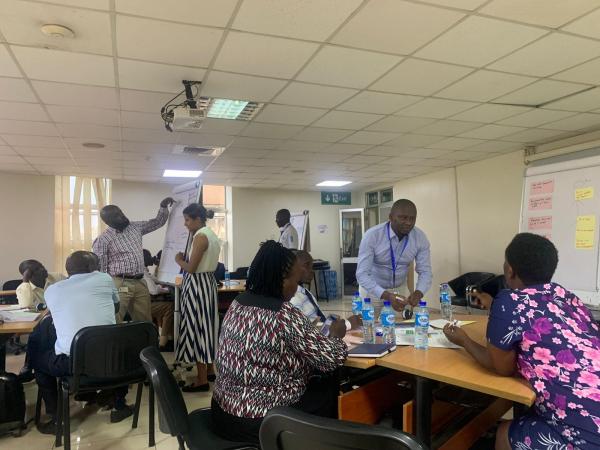Co-creation: a key but often ignored ingredient to successful water, sanitation and solid waste solutions
Reflections from Uganda Water and Environmental Week
29 Apr 2024 by The Water Diplomat

Stakeholders often know what solutions are needed and wanted for their contexts. Sometimes, they even have ideas on how to achieve them. External researchers and implementers working in development projects need to understand this, and know when, how and where this is crucial. This was the overarching message that resonated in two workshops held during the Uganda Water and Environmental Week a few weeks ago in Kampala.
In one of the workshops, researchers from Makerere University and the Swiss Federal Institute of Aquatic Science and Technology (EAWAG) sought to understand which low-cost water, sanitation and/or solid waste technologies were relevant for Kakooge and Wobulenzi towns in central Uganda. This is in the context of the Water, Behavior Change and Environmental Sanitation (WABES) Integrate project funded by the Swiss Agency for Development Cooperation. They gathered stakeholders from the NGO, government, town council among others to seek their views on the technologies that have or would work for the two towns.
Surprisingly, the two hours planned for the session were almost not enough. The stakeholders suggested and discussed multiple solutions including lining pits, household water treatment, and informed about private financing st others. It was clear that they had either seen the solutions work or they were confident that they would potentially work if implemented in their context.
The second workshop by the same researchers sought to understand the capacity development needs and wishes of the stakeholders at the municipal level in the two towns. In contrast to the first one, the stakeholders did not only identify training options for their shortcomings, but also went further. They prioritized the trainings, shaped the potential courses, the time requirements, the profile of trainers, level of training, and source of funds for the trainings.
Because of the two workshops, the co-created proposed solutions reflected the stakeholders’ interests and context knowledge. It also encouraged peer learning not only among practitioners, but in addition cross learning with researchers. Studies have demonstrated the importance of such co-creation exercises in research and development programs to improve the effectiveness of outcomes and maximize their contribution to impact.
However, such engagement activities and processes are not without challenges. Identifying who and how to engage, segmenting stakeholders, power status differences and uneven information sharing can quickly alter the outcomes of the engagements. Extensive engagement further demands more time and resources, which are scarce in most project contexts. While this case involved only implementing stakeholders, engagement goes beyond and incorporates intermediaries and recipients of interventions. Therefore, such activities run the risk of appearing as reducing the efficiency of projects.
Despite the challenges, it is imperative that project/program managers, whether running research or development programs incorporate context knowledge of stakeholders closer to the challenges they target. In addition, they should involve the stakeholders in co-creating solutions that work for them. Engagement activities such as the co-creation workshops above among others are avenues for this. However, this calls for allocating resources for this during program design. Above all, the realisation that engagement is not a one-time event but a process anchored on trust and relationship building is vital in these activities.
